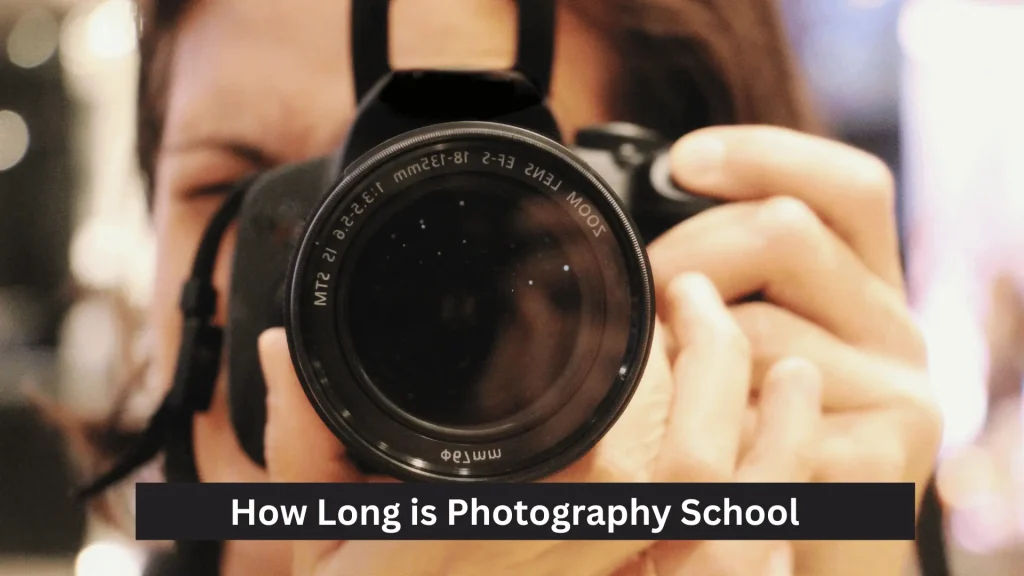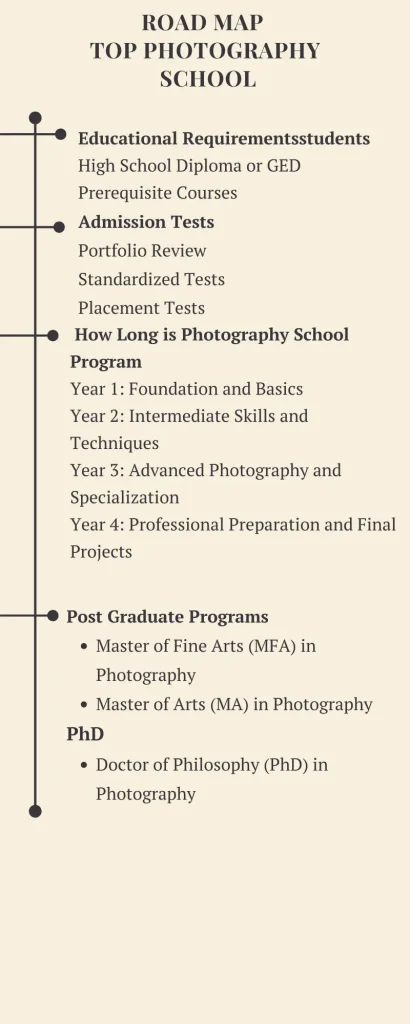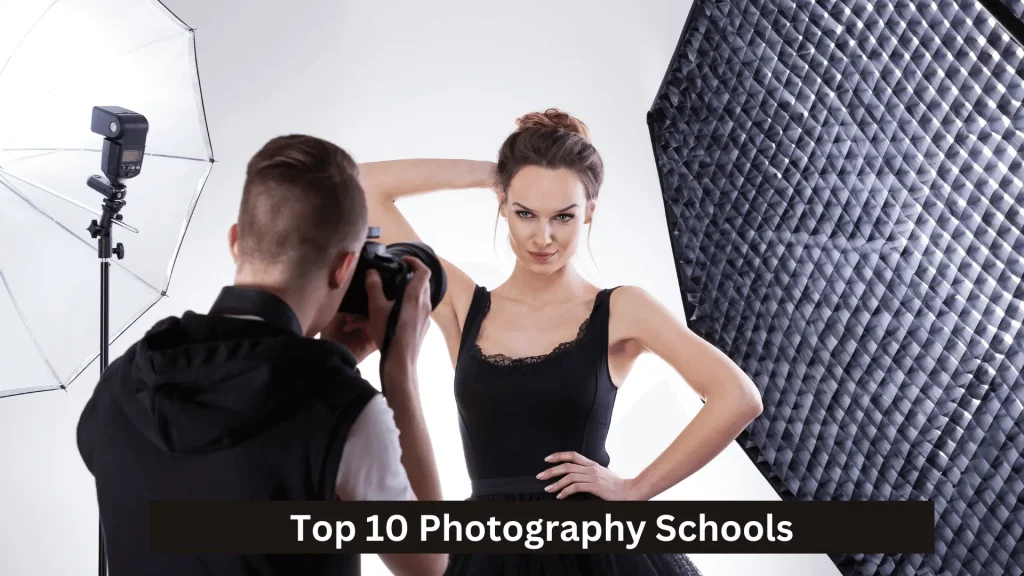How Long is Photography School
How Long is Photography School? The duration of photography school varies depending on the program. Certificate programs can take a few months, while associate degrees typically last two years. Bachelor’s degrees in photography usually require four years to complete. Specialized workshops and short courses can also provide training in a few weeks or months.
What is Photography School?
Photography school is an educational institution or program that teaches the art and science of photography. These schools offer various courses that cover technical skills, such as camera operation and editing software, as well as artistic techniques like composition and lighting. Students learn to develop their style and build a professional portfolio.

Photography schools provide a structured learning environment where aspiring photographers can gain comprehensive knowledge and practical experience. Programs range from short workshops to full degree courses, catering to different levels of expertise and career goals. Graduates can pursue careers in various fields, including commercial photography, photojournalism, and fine art photography.
How Long is Photography School
Year 1: Foundation and Basics
Introduction to Photography: Understanding the history and basics of photography, including camera types and functions.
Basic Techniques: Learning fundamental skills like exposure, composition, and lighting.
Digital Editing: Introduction to editing software such as Adobe Photoshop and Lightroom.
Art and Design Principles: Courses on color theory, design fundamentals, and visual storytelling.
General Education Courses: Subjects like English, math, and social sciences to build a well-rounded educational foundation.
Year 2: Intermediate Skills and Techniques
Intermediate Photography: Advanced camera techniques and photographic styles.
Studio Lighting: In-depth study of artificial lighting setups and techniques.
Digital Imaging: Advanced digital editing and manipulation techniques.
Specialized Photography: Introduction to areas like portrait, landscape, and documentary photography.
General Education Courses: Continued coursework in general education subjects.
Year 3: Advanced Photography and Specialization
Advanced Techniques: Mastering complex photographic techniques and equipment.
Portfolio Development: Creating a professional portfolio showcasing a range of skills and styles.
Specialized Courses: In-depth study of chosen specializations such as fashion, commercial, or fine art photography.
Business Practices: Learning the business aspects of photography, including marketing, contracts, and client relations.
Internships and Projects: Gaining practical experience through internships or real-world projects.
Year 4: Professional Preparation and Final Projects
Capstone Project: Completing a significant project or series of works that demonstrate mastery and personal style.
Professional Practices: Preparing for a career with courses on business planning, portfolio reviews, and job search strategies.
Advanced Specialized Courses: Further study in the chosen field of specialization.
Exhibition and Critique: Participating in exhibitions and receiving feedback from peers and instructors.
Internships: Continued professional experience to prepare for post-graduation employment.
Throughout the four-year program, students receive a mix of theoretical knowledge and hands-on practice, preparing them for various careers in photography.

How to Enter Photography School
Educational Requirements
High School Diploma or Equivalent: Most photography schools require applicants to have completed high school or possess a GED.
Prerequisite Courses: Some programs may require prior coursework in art, design, or digital media.
Basic Photography Knowledge: While not always mandatory, having a foundational understanding of photography can be beneficial.
Entry Tests
Portfolio Review: Many schools require a portfolio showcasing the applicant’s photography skills and creativity.
Standardized Tests: Some programs may ask for SAT or ACT scores, though this varies by institution.
Interview: An interview with faculty members or admission officers may be part of the selection process.
Application Process
Application Form: Complete the online or paper application form provided by the school.
Personal Statement: Write an essay explaining your interest in photography, career goals, and why you chose the specific school.
Letters of Recommendation: Provide letters from teachers, mentors, or employers who can attest to your skills and character.
Transcripts: Submit official high school transcripts or equivalent documents.
Application Fee: Pay the required application fee, which varies by institution.
Financial Aid
Scholarships: Many schools offer merit-based scholarships specific to photography or the arts. These can be awarded based on talent, academic achievement, or financial need.
Grants: Federal and state grants, such as the Pell Grant, can provide need-based financial assistance.
Loans: Federal student loans (e.g., Direct Subsidized and Unsubsidized Loans) and private loans can help cover tuition and other expenses.
Work-Study Programs: Eligible students can participate in work-study programs to earn money while gaining relevant experience.
School-Specific Aid: Some photography schools offer their own financial aid packages, which may include a combination of scholarships, grants, and work-study opportunities.
External Scholarships and Grants: Numerous organizations and foundations offer scholarships and grants to students pursuing degrees in photography or related fields.
It’s essential to check the specific requirements and offerings of each photography school as they can vary widely.
Post Graduate and PhD Programs
Postgraduate and PhD programs in photography offer advanced study and research opportunities for individuals looking to deepen their expertise and pursue academic or professional careers in the field. Here’s an overview of what these programs typically entail:
Postgraduate Programs (Master’s Degrees)
Master of Fine Arts (MFA) in Photography
Duration: Generally takes 1.5 to 3 years to complete.
Curriculum: Focuses on advanced photographic techniques, theory, and critical analysis.
Thesis or Project: Requires a culminating thesis project or exhibition that demonstrates mastery and originality in the field.
Specializations: Often allows students to specialize in areas like documentary photography, fine art photography, or commercial photography.
Master of Arts (MA) in Photography
Duration: Usually completed in 1 to 2 years.
Curriculum: Combines theoretical study with practical application, emphasizing research and critical analysis.
Focus Areas: May include visual culture, media studies, or photography history alongside practical skills development.
PhD Programs in Photography
Doctor of Philosophy (PhD) in Photography
Duration: Typically takes 3 to 5 years to complete.
Research Focus: Involves in-depth research into a specialized area of photography.
Dissertation: Requires a substantial original research project that contributes new knowledge to the field.
Interdisciplinary Study: Often encourages interdisciplinary research, integrating photography with fields like art history, cultural studies, or technology.
Top 10 Photography University
Here are ten renowned photography schools known for their excellent programs, faculty, and resources:

New York University (NYU) Tisch School of the Arts – Offers a highly regarded Photography & Imaging program with access to New York City’s vibrant arts scene.
School of Visual Arts (SVA) – Known for its diverse photography programs and strong emphasis on both traditional and contemporary photographic techniques.
Rhode Island School of Design (RISD) – Offers a comprehensive Fine Arts program with a strong focus on photography, integrating technical skills with critical theory.
Rochester Institute of Technology (RIT) – Renowned for its School of Photographic Arts and Sciences, offering specialized degrees in photography and imaging technologies.
California Institute of the Arts (CalArts) – Offers a Photography and Media program known for its experimental approach and emphasis on artistic exploration.
Yale University School of Art – Provides a prestigious MFA program in photography known for its rigorous curriculum and distinguished faculty.
University of California, Los Angeles (UCLA) – UCLA School of the Arts and Architecture offers a Photography program that combines technical training with critical thinking.
Art Center College of Design – Located in Pasadena, CA, known for its rigorous Photography and Imaging program focusing on commercial and fine art photography.
Parsons School of Design at The New School – Offers a Photography program with a strong emphasis on the intersection of photography with other art forms and disciplines.
Columbia College Chicago – Known for its Photography program offering a blend of traditional and digital techniques with opportunities for hands-on experience and professional development.
These schools are recognized for their academic excellence, faculty expertise, facilities, and opportunities for professional development, making them top choices for aspiring photographers seeking quality education and preparation for careers in photography.
Factors Affecting the Length of Photography School
Several factors can influence the duration of photography school programs:
Degree Level: The length varies based on whether it’s a certificate, associate’s, bachelor’s, master’s, or doctoral program. Certificate programs can be completed in a few months, while doctoral programs may take several years.
Program Structure: Some schools offer accelerated programs or intensive courses that can shorten the overall duration.
Specialization: Programs focusing on specific aspects of photography, such as fine art, commercial photography, or photojournalism, may have varying lengths depending on the depth and breadth of study required.
Full-time vs. Part-time: Attending photography school full-time typically results in faster completion compared to part-time study, which allows for flexibility but extends the overall duration.
Internships or Co-op Requirements: Programs that include mandatory internships or cooperative education experiences may require additional time to complete.
Portfolio or Thesis Requirements: Programs that culminate in a portfolio review, thesis project, or dissertation may require additional time for preparation and completion.
Prerequisites and Prior Experience: Entry requirements such as prior coursework or professional experience in photography can impact the overall length of the program.
Summer Programs or Intensives: Schools offering summer programs or intensive courses may provide opportunities to accelerate learning or fulfill certain credit requirements more quickly.
Flexible Scheduling: Some programs offer flexible scheduling options, allowing students to customize their course load and potentially shorten or extend the duration based on personal circumstances.
Understanding these factors can help prospective students choose a photography school program that aligns with their career goals, preferred learning pace, and schedule constraints.
Final Verdict
Choosing a photography school involves considering various factors like program length, specialization, and degree level. Understanding these factors helps students make informed decisions about their education and career paths in photography.
FAQs
1.How long does it take to complete a photography degree?
The duration varies by degree level. A bachelor’s degree typically takes 4 years, while master’s programs can range from 1.5 to 3 years. Certificate programs may take a few months to a year.
2.What are the typical entry requirements for photography school?
Entry requirements often include a high school diploma or equivalent, a portfolio showcasing photography skills, letters of recommendation, and sometimes standardized test scores like the SAT or ACT.
3.Are there scholarships available for photography students?
Yes, many photography schools offer merit-based scholarships. Additionally, external organizations and foundations provide scholarships specifically for photography students based on talent and financial need.
4.What career options are available after graduating from photography school?
Graduates can pursue careers as fine art photographers, commercial photographers, photojournalists, photo editors, or work in fields like fashion photography, advertising, and more.
5.Can I study photography online or part-time?
Yes, many schools offer online or part-time options for studying photography. These programs provide flexibility for students balancing work or other commitments while pursuing their degree
